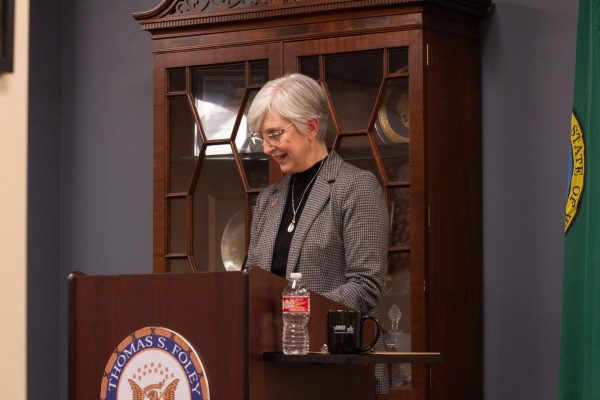Clawing for Coug parking
October 24, 2014
Pullman can expect to see some creative parking methods on College Hill this weekend as swathes of dads and other visitors clog the narrow streets with rental cars, family vehicles and Couged-out RVs.
But with such weekend caravans come a number of issues for local police officers.
One issue, said Pullman Police Chief Gary Jenkins, occurs when visitors or residents park vehicles on front lawns, which typically results in a ticket for the owner.
City code defines a lawn or yard as “that area extending across the full width of a property, from the property line to the first supporting member of a structure.”
Per the code, “Parking of vehicles is prohibited within any yard abutting a public street on any property located within a residential zone district” – the only exceptions being vehicles for property maintenance and public safety, and those parked in authorized driveways or parking areas.
A driveway, added District Judge Douglas Robinson, who judges parking infractions, is invariably marked by a break in the curb that separates it from a public street.
“If you have to drive over a curb and make a hard right to park, that’s not legal,” Robinson said. “If people gotta park a little far away and walk a few blocks, well, that’s what you gotta do.”
Other common violations include blocking arterial roads – a potential fire hazard and towable offense – and parking in handicap spaces without a state-issued permit. WSU permits for people with disabilities are not valid off campus, and the fine for parking illegally in handicap spaces is $450.
“The handicap restriction is pretty unforgiving,” Robinson said. “It’s set in stone.”
Robinson said the excuses he hears most frequently for parking violations include: I was only there for a short while, I was afraid to park too far from the building, and I didn’t know I couldn’t park there.
He acknowledged it’s often unclear where parking is legal on College Hill, noting that some signs are blocked by trees or have been stolen.
“I think that justice requires that there be fair notice of the restrictions,” he said. “I am always in favor of more signage. I believe that as much notice as possible is preferable.”
Signs are not required, however, for an officer to issue a ticket for parking on a sidewalk, crosswalk, planter or intersection; in front of a stop sign; against the flow of traffic; or in such a way that obstructs traffic.
This often proves difficult, but it’s not optional, Robinson said.
Of the parking situation in general, he said, “It’s a mess. It always has been, and it always will be.”

















